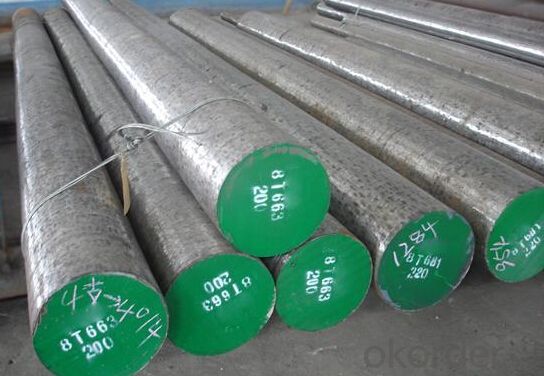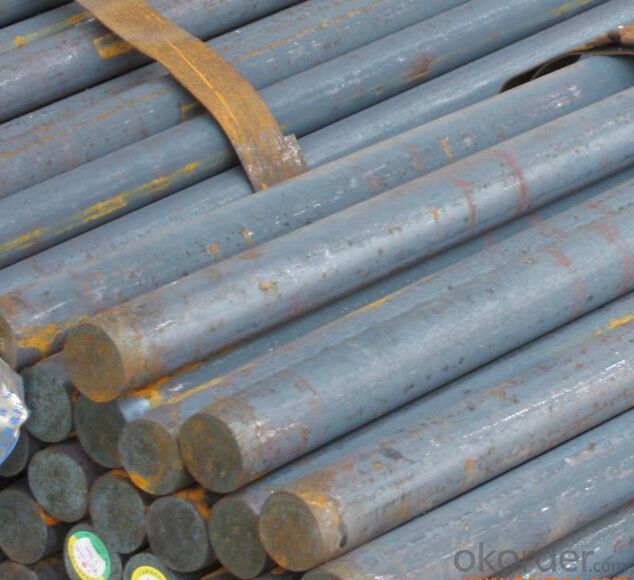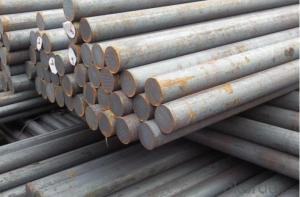GCr15 Special Steel with High Heavy and High Quality
- Loading Port:
- Shanghai
- Payment Terms:
- TT OR LC
- Min Order Qty:
- 3 m.t.
- Supply Capability:
- 10000 m.t./month
OKorder Service Pledge
OKorder Financial Service
You Might Also Like
Item specifice
Products Specifications:
We have the CNC computer spring machine, non-cam and non-rocker, independent control by multiple servo motor, which can produce the biggest diameter spring. Fast production, precision positioning, steady operation. | |
Wire diameter: | 0.08mm-10mm. Size and style are made by drawings. |
Materials: | adopt the domestic and imported swc, sus, swp, mild steel wire, manganese steel wire, phosphorus copper wire, nickel-plated wire, zinc-plated wire, tin-plated copper wire, nickel-plated steel wire, non-magnetic stainless steel wire, heat-resistant steel wire, duplex stainless steel wire(corrosion resistant and heat resistant steel wire), bronze, copper, phosphorus copper, beryllium copper. Alloy steel has 60Si2MNA, 60Si2CRVA, 55CrSi. |
Surface treatment: | plate gold, silver, white, red yellow, blue, green, purple, black, etc., salt spray test more than 100 H. Appearance beautiful and bright. |
Application: | electronics, electrical appliances, toys, locks, stationery, furniture, washing machines, vacuum cleaners, lamps and lanterns, stroller, bicycle, gift, handicraft, gifts, cameras, printers, office equipment, precision equipment, all kinds of transportation, car accessories, sports equipment, switches, sockets, water heater, calculator, watches, ignition, mouse, motor, mobile phone, mementoes, fan, video DVD, etc |
Product Applications:
High Heavy and High Quality Bearing Steel GCr15 are ideal for structural applications and are widely used in the construction of buildings and bridges, and the manufacturing, petrochemical, and transportation industries.
Chemical Composition:
Grade | AISI 52100, ASTM E52100, DIN 1.3505,JIS SUJ2, GCr15 |
| Length: 2000-13000mm or as required |
Shape | Round Bar |
Type | Alloy Steel Bar |
Delivery Condition | Black Surface |
Material | Bearing Steel |
Technique | Hot Rolled |
Product Advantages:
OKorder's High Heavy and High Quality Bearing Steel GCr15 are durable, strong, and resist corrosion.
Main Product Features:
· Premium quality
· Prompt delivery & seaworthy packing (30 days after receiving deposit)
· Corrosion resistance
· Can be recycled and reused
· Mill test certification
· Professional Service
· Competitive pricing


- Q:What are the advantages of using special steel over other materials?
- There are several advantages of using special steel over other materials. Firstly, special steel has higher strength and toughness, making it more durable and resistant to wear and tear. Secondly, it offers excellent corrosion resistance, preventing rust and extending the lifespan of the product. Additionally, special steel can withstand extreme temperatures, making it suitable for applications in various industries. Moreover, its versatility allows for easy customization and shaping, meeting specific design requirements. Lastly, special steel is known for its high recyclability, making it an environmentally friendly choice.
- Q:How does special steel perform in high-pressure environments?
- Special steel performs exceptionally well in high-pressure environments due to its unique composition and properties. It is designed to withstand extreme pressure and temperature conditions without deforming or losing its structural integrity. The high tensile strength and hardness of special steel enable it to resist the forces exerted by high pressures, making it an ideal material for applications such as oil and gas pipelines, pressure vessels, and hydraulic systems. Additionally, special steel's excellent corrosion resistance ensures its durability and longevity in aggressive environments, further enhancing its performance in high-pressure settings.
- Q:What are the factors that affect the wear resistance of special steel?
- There are several factors that affect the wear resistance of special steel. Some of the key factors include the composition of the steel, particularly the presence of alloying elements such as chromium, tungsten, and vanadium, as these elements can enhance the hardness and toughness of the steel. The microstructure of the steel also plays a significant role, with a fine-grained structure and a homogeneous distribution of carbides generally resulting in improved wear resistance. Additionally, the heat treatment process used to harden the steel can greatly influence its wear resistance, as it affects the formation and distribution of various microstructural features. Surface finish and lubrication conditions can also impact the wear resistance of special steel, as a smooth surface and proper lubrication can reduce friction and wear. Finally, the operating conditions, such as load, speed, and temperature, can significantly affect the wear resistance of special steel, as excessive loads or high temperatures can lead to increased wear and deterioration of the steel's performance.
- Q:How does special steel perform in terms of hardness?
- Special steel typically performs very well in terms of hardness. It has a higher hardness level compared to regular steel due to the addition of various alloying elements during its production. This enhanced hardness allows special steel to withstand wear, abrasion, and deformation better than other types of steel. It also enables special steel to be suitable for specialized applications that require high strength and resistance to impact or pressure.
- Q:What are the different methods for improving the machinability of special steel?
- There are several methods for improving the machinability of special steel, including: 1. Alloying: Adding elements such as sulfur, lead, or selenium to the steel composition can enhance machinability by forming brittle compounds that break up chips during machining. 2. Heat treatment: Proper heat treatment, such as annealing or stress relieving, can reduce hardness and improve machinability. 3. Cutting tool selection: Choosing appropriate cutting tools with the right geometry, coatings, and materials can significantly enhance machinability. 4. Lubrication: Using suitable cutting fluids or lubricants during machining can reduce friction, heat generation, and tool wear, thereby improving machinability. 5. Machining parameters optimization: Adjusting cutting speed, feed rate, and depth of cut can optimize chip formation, reduce cutting forces, and enhance machinability. 6. Surface treatments: Applying surface coatings or treatments, such as nitriding or carburizing, can improve the wear resistance and reduce friction, leading to improved machinability. 7. Material selection: Selecting alternative steel grades with inherently better machinability characteristics can be an effective method for improving machinability.
- Q:What are the main applications of special steel in the power distribution industry?
- The main applications of special steel in the power distribution industry include the manufacturing of power transmission towers, transformers, and various high voltage equipment. Special steel is used due to its excellent strength, durability, and resistance to corrosion, which are crucial qualities for ensuring the reliability and efficiency of power distribution systems.
- Q:What are the different impact-resistant grades of special steel?
- Impact-resistant grades of special steel refer to steel alloys that are specifically designed to withstand high impact and shock loads without fracturing or deforming. These grades of steel are commonly used in applications where resistance to impact and toughness are crucial, such as in construction, mining, automotive, and defense industries. There are several different impact-resistant grades of special steel available, each with its own unique characteristics and properties. Some of the commonly used impact-resistant grades include: 1. AR400: This grade of steel has a nominal hardness of 400 Brinell (HB) and is known for its exceptional resistance to abrasion and impact. It is often used in applications where high wear resistance is required, such as in bucket liners, crushers, and hoppers. 2. AR500: With a nominal hardness of 500 HB, AR500 steel offers even higher resistance to wear and impact compared to AR400. It is commonly used in applications involving heavy machinery, mining equipment, and armored vehicles. 3. AR600: This grade of steel has a nominal hardness of 600 HB, making it one of the toughest and most impact-resistant steels available. It is often used in applications where extreme wear resistance and durability are essential, such as in chutes, conveyors, and ballistic protection. 4. T-1: T-1 steel is a high-strength, low-alloy (HSLA) steel that offers excellent impact resistance and toughness. It is typically used in applications where high strength and toughness are required, such as in structural components, heavy equipment, and offshore drilling rigs. 5. QT or Quenched and Tempered Steels: These steels are specifically heat-treated to enhance their toughness and impact resistance. They are commonly used in applications that require a combination of high strength, toughness, and impact resistance, such as in gears, shafts, and armor plates. It is important to note that the specific impact resistance of a steel grade depends not only on its composition but also on factors such as heat treatment, fabrication techniques, and design considerations. Therefore, it is crucial to consult with steel manufacturers or experts to determine the most suitable impact-resistant grade for a particular application.
- Q:How does spring steel maintain its elasticity?
- Spring steel maintains its elasticity due to its unique composition and heat treatment process. It is made from a high carbon steel alloy, which provides it with exceptional strength and flexibility. Additionally, spring steel undergoes a specific heat treatment called quenching and tempering. During this process, the steel is heated to a high temperature and then rapidly cooled, which creates a hardened structure. This hardened structure allows spring steel to withstand repeated bending and twisting without permanently deforming. Overall, the combination of high carbon content and heat treatment enables spring steel to maintain its elasticity and resilience.
- Q:What are the properties of magnesium alloys?
- Magnesium alloys possess several important properties. They have a low density, making them lightweight and ideal for applications where weight reduction is crucial. They exhibit high strength-to-weight ratio, which makes them strong and durable. Magnesium alloys also have good heat dissipation properties, making them suitable for applications that require efficient cooling. They have excellent corrosion resistance, particularly when properly coated or treated. Additionally, magnesium alloys demonstrate good machinability and can be easily formed into various shapes and components.
- Q:How is nitrogen alloyed steel used in the production of high-strength bolts?
- Nitrogen alloyed steel is used in the production of high-strength bolts because it enhances the steel's strength and durability properties. The addition of nitrogen to the steel composition improves its hardenability, meaning it can be heat treated to achieve higher strength levels. This makes nitrogen alloyed steel ideal for manufacturing high-strength bolts that can withstand heavy loads and provide superior performance in various applications.
1. Manufacturer Overview |
|
|---|---|
| Location | |
| Year Established | |
| Annual Output Value | |
| Main Markets | |
| Company Certifications | |
2. Manufacturer Certificates |
|
|---|---|
| a) Certification Name | |
| Range | |
| Reference | |
| Validity Period | |
3. Manufacturer Capability |
|
|---|---|
| a)Trade Capacity | |
| Nearest Port | |
| Export Percentage | |
| No.of Employees in Trade Department | |
| Language Spoken: | |
| b)Factory Information | |
| Factory Size: | |
| No. of Production Lines | |
| Contract Manufacturing | |
| Product Price Range | |
Send your message to us
GCr15 Special Steel with High Heavy and High Quality
- Loading Port:
- Shanghai
- Payment Terms:
- TT OR LC
- Min Order Qty:
- 3 m.t.
- Supply Capability:
- 10000 m.t./month
OKorder Service Pledge
OKorder Financial Service
Similar products
New products
Hot products
Related keywords





























